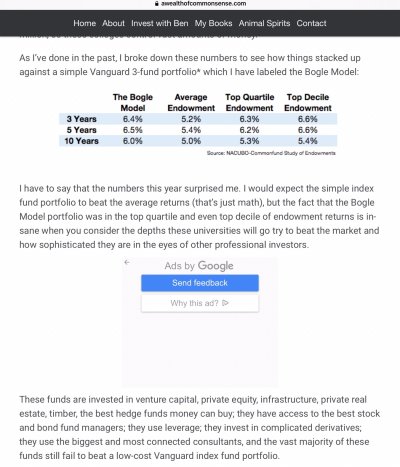OldShooter
Give me a museum and I'll fill it. (Picasso) Give me a forum ...
For those who don't know, Swensen was a kind of stealthy Warren Buffet, primarily an investment strategist, who had huge success running the Yale endowment. Here is the NPR obit: https://www.npr.org/2021/05/08/9947...-you-maybe-never-heard-of-leaves-powerful-leg
Purely by coincidence, a few months ago I bought a copy of Swensen's book "Unconventional Success," written for individual investors. It's 15 years old and my expectation was that comparing his strategy and recommendations to what actually transpired over 15 years would be very interesting.
What I got was very different from what I expected. The book peels the indexing onion a couple of layers beyond what authors like Malkiel and Ellis have given us. Lots of detailed information on cost tradeoffs, well seasoned with contempt for much of the investment industry. It's as fresh and relevant as tomorrow's news. As an index investor, one thing very interesting to me was the problem of how indexes are created and maintained. This has major effect on fund turnover and, hence, fund cost. He singles out the Russell 1000 and 2000 indexes as particularly bad actors, creating unnecessary turnover. Also, the book has an excellent index, making it a great reference.
With his death, I suppose there will be new interest in this book, but if you can get a copy I don't think you'll regret it.
Purely by coincidence, a few months ago I bought a copy of Swensen's book "Unconventional Success," written for individual investors. It's 15 years old and my expectation was that comparing his strategy and recommendations to what actually transpired over 15 years would be very interesting.
What I got was very different from what I expected. The book peels the indexing onion a couple of layers beyond what authors like Malkiel and Ellis have given us. Lots of detailed information on cost tradeoffs, well seasoned with contempt for much of the investment industry. It's as fresh and relevant as tomorrow's news. As an index investor, one thing very interesting to me was the problem of how indexes are created and maintained. This has major effect on fund turnover and, hence, fund cost. He singles out the Russell 1000 and 2000 indexes as particularly bad actors, creating unnecessary turnover. Also, the book has an excellent index, making it a great reference.
With his death, I suppose there will be new interest in this book, but if you can get a copy I don't think you'll regret it.

